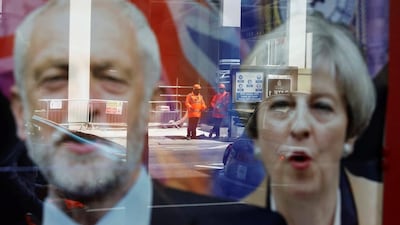The red brick Conservative club in Summerstown in southwest London has the unmistakeable appearance of a place suffering a downturn in fortunes.
For one thing the building has lost its tenant after the Conservative member of parliament representing the locality, Jane Ellison, was beaten in the June election. The taxpayer-funded constituency office has been shut down. "I'm afraid there is no Conservative operation here any more. It's all in flux," the manager tells The National. "We have a Labour MP now. It's the way it is."
Before the vote Mrs Ellison was well-entrenched with a large majority and was climbing the slippery ministerial poll. As a minister in the Treasury (finance ministry) she had a good reputation and promotion was in the pipeline.
High hopes existed for another Conservative candidate who was targeting Tooting, another local seat.. Dan Watkins, a small businessman, is a local resident, active in community groups and passionate about mainstream issues. Instead the Labour majority soared in Tooting.
Despite appearances, the area is on the up. The drab landscape of this part of south-west London is set to change with a major redevelopment. A Conservative-controlled council approved plans to redevelop nearby Wimbledon Greyhound racing stadium into a new football ground.
However,the voters turned against the Conservatives. Commentator George Trefgarne pins the blame firmly on Theresa May's identification with struggling, poorer voters. In effect the Conservatives flipped to the other side of the class war.
He warns much of the city is slipping out of reach for the party under its current leadership.
"The idea that the Conservative Party can win an election while somehow being wiped off the map in London – the capital city – is surely absurd and certainly without precedent," he says. "I have seen forecasts, for instance, which show that the flagship boroughs of Wandsworth and Westminster could be lost in the local elections next year. Surely, we can all see that is disastrous. Hopeless. The road to ruin."
The debate on the future of the Conservative Party is only just coming to terms with the setback it suffered in losing its overall majority after a surprise surge by Jeremy Corbyn's hard-left Labour Party in June.
Some say the party must rediscover its economic message to counter Mr Corbyn's socialism.
Kwasi Kwarteng, a member of parliament and a voice on the right wing of the party, believes the leadership can only draw a contrast with Corbyn when they address the shortage of affordable housing for younger voters.
"Conservatives should celebrate the wealth-generating potential of free markets and individual enterprise," he wrote in the Daily Telegraph last week. "This has been particularly challenging given the widely acknowledged housing crisis."
Turning to a now forgotten Conservative thinker, Noel Skelton, Kwarteng extolled a theme, as yet not defined, of "Constructive Conservativism".
Other activists look to the successes of [former prime minister] David Cameron's leadership as a high watermark for the party. "It's important that the Tories continue social reforms, certainly if the party wants to attract younger and urban voters," said Daniel Korski, the former deputy head of the policy unit at Number 10 Downing Street under Mr Cameron's tenure there.
Political scientists say the problems of the Conservatives lie around a slew of seats lost near the major road corridors of southern England. It is along those commuter belts where voters fled the party. That not only applies to constituencies covering south London, but also Slough along the M4 motorway near Heathrow airport and all the way across to Bristol in the west of England, at the gateway to Wales.
The socially-inclusive, economically-liberal formula espoused by Cameron was dropped by Mrs May as she sought to attract those who supported Britain's exit from the EU and economic fairness.
"The party wildly overestimated the effect of Brexit in bringing new voters to support us and at the same time underestimated the numbers voting against us whose vote to remain in the EU was a motivating factor," said Nabil Najjar, a founder of Conservative Progress, a new grouping that hopes to reinvigorate the party's grass roots. "We need a unifying concept of what being a Conservative is all about. And we need to offer, unlike the last election, a well thought-out manifesto with a core vision."
Mrs May is seen in party ranks as a caretaker who will not contest the next election. However the party appears to have put off a push to remove her for at least two years. When the time comes the choice is likely to be between an experienced cabinet minister and a fresh-faced junior with a new message.
Mr Najjar is a veteran of Conservative campaigns in London that saw the Labour-leaning city twice vote in the Conservative Boris Johnson, now foreign secretary, as its mayor.
The party's challenge is to reshape its campaigns to contest the strength of Labour supporting groups such as Momentum, which enthused millions of first time voters.
"We can't just rely on a combination of rural, suburban and well-off voters any more," said Mr Najjar. "Conservatives need to make an impression on voters. We need to build a dialogue street by street with digital campaigns and we need to organise activists to be on the move, making our presence felt where we take on Labour."
Mr Watkins remains politically engaged despite his defeat in Tooting. He believes the party was hit by a perfect storm in London of Remain voters boycotting the party to prevent a Conservative majority and parts of the middle class lashing out at the incumbent government.
"We are really struggling there and have to improve. Tooting is very young and very public sector and they are the two groups we really struggled with," he said. "We need to see housing and childcare costs reduce. I think our policies on both will have an impact - let's hope its enough."


